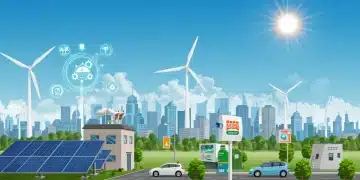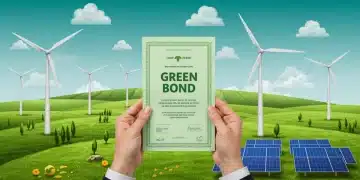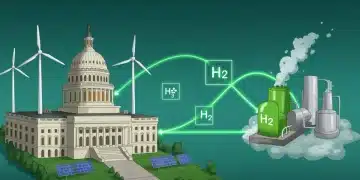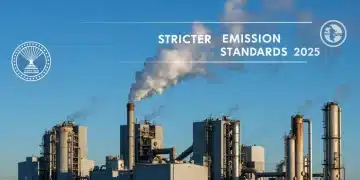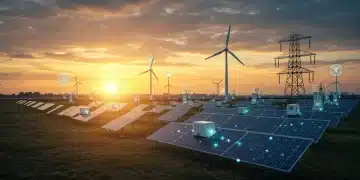Climate policy changes impacting the global economy

Climate policy changes impacting the global economy create opportunities for renewable energy, green technologies, and sustainable practices, driving innovation and economic growth across affected sectors.
Climate policy changes impacting the global economy are becoming increasingly relevant as countries adapt to environmental challenges. Have you ever wondered how these shifts influence your daily life and the economy? Let’s dive into this pressing issue.
Understanding climate policy changes
Understanding climate policy changes is crucial in today’s world. As nations worldwide face the impact of climate change, policies are evolving. These changes aim to reduce emissions and promote sustainability, affecting how businesses operate and how economies function.
Climate policies are implemented at both national and international levels. Governments often seek to establish regulations that limit greenhouse gas emissions and foster renewable energy sources. This isn’t just about protecting the environment; it directly impacts economic stability and growth.
Key Factors in Climate Policy Changes
Multiple factors drive the evolution of climate policies. These include technological advancements, scientific research, and public awareness. Stakeholders like businesses, NGOs, and citizens play a significant role in shaping these policies.
- Technological advancements provide new solutions for sustainability.
- Scientific research highlights the urgent need for change.
- Public awareness increases demand for greener practices.
Another significant aspect is the alignment of climate goals with economic objectives. Many countries are now realizing that a strong economy can coexist with environmentally responsible practices. For instance, investing in renewable energy can create jobs and stimulate growth while reducing carbon footprints.
The Role of Businesses
Businesses must also adapt to these shifting policies. Those that proactively embrace sustainable practices can lead in innovation and capture new markets. This adaptation might involve adjusting supply chains, shifting to greener materials, or investing in clean technologies.
This shift not only helps the environment but also builds resilience against future regulatory changes. Understanding these dynamics can empower organizations to make informed decisions, benefiting both their operations and the planet.
In summary, engaging with climate policy changes is essential. It helps organizations and individuals not only comply with regulations but also thrive in a changing economic landscape.
Economic impacts of climate policy

Understanding the economic impacts of climate policy is essential for grasping how environmental measures can influence markets. As nations develop stricter regulations, the effects ripple through various sectors, prompting both challenges and opportunities.
One major area affected is energy production. Transitioning to renewable energy sources like wind and solar power can shift job markets. While this creates green jobs, it may also lead to job losses in traditional energy sectors. Companies must adapt quickly to remain competitive.
Impact on Industries
Several industries experience significant changes due to climate policies. Manufacturing industries may face increased costs due to compliance with emissions regulations. However, these challenges can push innovation, leading to the development of cleaner technologies.
- Manufacturers are increasingly investing in cleaner technology.
- The automotive industry is shifting towards electric vehicles.
- Construction is embracing sustainable building materials.
Additionally, agricultural practices are changing as farmers adapt to new regulations. Sustainable farming can lead to better soil health and increased biodiversity. However, this often requires initial investments, which can strain budgets.
Investment and Growth Opportunities
Investments in green technology present significant growth opportunities. As demand for sustainable solutions rises, businesses that innovate can reap economic benefits. For example, firms involved in carbon capture technologies may see a surge in demand as policies tighten.
Moreover, governments often provide incentives for companies investing in sustainable practices. These can range from tax breaks to grants, encouraging businesses to transition to greener operations. Understanding these economic dynamics can empower stakeholders to make informed decisions.
In summary, climate policy is reshaping economic landscapes across the globe. While it poses challenges, it also opens new avenues for growth and innovation.
Sectors most affected by climate initiatives
When looking at the sectors most affected by climate initiatives, several industries stand out. These sectors must adapt to new regulations and consumer preferences as countries strive for sustainability. The drive towards a greener economy is reshaping many business landscapes.
One of the primary sectors impacted is energy. Traditional fossil fuels are being replaced by renewable sources like solar and wind power. This shift has profound implications for energy companies, requiring them to innovate or risk obsolescence.
Transportation Industry Transformation
The transportation sector is also undergoing significant changes. With a push toward electric vehicles, automakers are investing heavily in new technologies. This transition carries economic ramifications, affecting everything from manufacturing processes to supply chains.
- Electric vehicle production is increasing sharply.
- Infrastructure for charging stations is expanding.
- Public transportation is incorporating more eco-friendly options.
Moreover, agriculture is feeling the impact as well. Climate policies encourage sustainable farming practices, requiring farmers to adapt. Techniques such as crop rotation and organic farming are becoming more prevalent. These practices can enhance soil health while reducing reliance on chemical fertilizers.
Construction and Real Estate Changes
The construction industry is another area affected. There is a notable shift towards sustainable building materials and energy-efficient designs. Companies are now focusing on minimizing waste and incorporating green technologies in their projects.
This change not only helps the environment but also attracts environmentally-conscious consumers. Real estate developers are increasingly marketing properties based on their sustainability features.
Together, these shifts illustrate how climate initiatives can influence various sectors, creating a ripple effect throughout the economy. By understanding these impacts, stakeholders can better prepare for future developments in their industries.
Opportunities arising from climate changes

As the world adapts to climate changes, numerous opportunities arising from climate changes are emerging. These opportunities span various sectors and can lead to innovation and growth. Companies have the chance to not only comply with new regulations but also thrive by embracing sustainable practices.
One area ripe for opportunity is the renewable energy sector. As governments push for greener solutions, investments in solar, wind, and other renewable sources are increasing. This trend is creating jobs and stimulating local economies.
Green Technology Innovations
Another exciting opportunity lies in the development of green technologies. Businesses that create solutions for energy efficiency, waste reduction, and environmental protection can tap into a growing market. Innovations such as smart grids, energy storage, and advanced recycling technologies are gaining traction.
- Smart home technology can help reduce energy consumption.
- Electric vehicles are becoming mainstream, enhancing transportation.
- Waste-to-energy systems are transforming how we manage waste.
Moreover, agriculture is evolving to capitalize on climate changes. Sustainable farming practices not only improve crop yields but also enhance biodiversity. Farmers are adopting techniques like permaculture and regenerative agriculture, which can lead to healthier ecosystems.
Financial Incentives and Funding
Various financial incentives are also in place to support sustainable projects. Governments often offer grants, tax credits, and subsidies for businesses that invest in green initiatives. Understanding these resources can empower entrepreneurs to launch sustainable ventures.
These financial opportunities encourage a shift towards more responsible business practices. As more companies recognize the value of sustainability, the market for eco-friendly products and services will likely continue to grow.
In summary, embracing the opportunities arising from climate changes can benefit both the economy and the environment. As the world evolves, industries that adapt to these changes will find success in their sustainability efforts.
In conclusion, navigating the landscape of climate policy changes reveals both challenges and opportunities for various sectors. As we adapt to new regulations, industries must innovate and embrace sustainable practices to thrive. These changes not only protect the environment but also foster economic growth and new job creation. By understanding and leveraging these trends, businesses can play a critical role in shaping a greener future.
FAQ – Climate Policy Changes and Their Economic Impact
What are the main benefits of renewable energy investment?
Investing in renewable energy can create jobs, reduce dependence on fossil fuels, and lower greenhouse gas emissions, contributing to a healthier environment.
How can businesses adapt to climate policy changes?
Businesses can innovate by adopting sustainable practices, investing in green technologies, and improving energy efficiency to meet new regulations.
Which sectors are most affected by climate initiatives?
Key sectors include energy, transportation, agriculture, and construction, all of which need to adjust to new sustainability goals.
What opportunities do climate changes present for new businesses?
Opportunities include developing green technologies, creating sustainable products, and accessing government incentives for eco-friendly initiatives.
